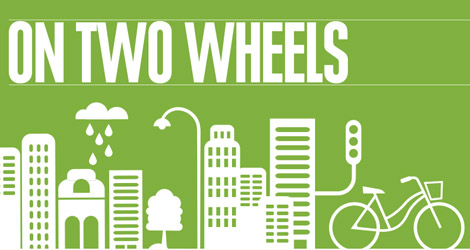On Two Wheels: Revolution in Drunk Cycling Laws
Four months ago, I warned against drunk cycling in Poland, describing unbelievably harsh laws enforced here and the misfortune of a Dutch journalist who spent a night in jail for cycling after a few beers. For some, it may be very welcome news that cycling after a few glasses of wine will no longer be a serious crime as of November 9 this year. Poland’s president Bronisław Komorowski has signed a major overhaul of the Criminal Code that includes softer laws for cyclist.
Polish prisons are full of cyclists. The government’s explanation for the new law was that, in 2010, as many as 12,966 people (that’s not a mistake) served prison terms for drunk cycling. These people did not cause much harm. The government report quoted in the parliamentary motion was very clear that drunk cyclists are involved in a very small fraction of all accidents: some 6 percent of all cycling accidents (not all of them caused by alcohol) and much below 1 percent of all accidents. The drunk cycling figures did not decrease during the 13 years when the law was in force. It costs roughly 500-700 euros per month to keep a person in prison, with judicial and police costs likely to be exorbitant too.
So what happened? Many believe that the reason behind the change is nothing to do with compassion for drunk cyclists. Many of them are poor country people with no other travel options (not to mention money for a lawyer) and are not a sought-after voting block. The real reason may be the succinctly-named “Council Framework Decision 2008/909/JHA of 27 November 2008 on the application of the principle of mutual recognition to judgments in criminal matters imposing custodial sentences or measures involving deprivation of liberty for the purpose of their enforcement in the European Union”. In short: prisons in Poland are overcrowded, and many inmates have successfully sued Poland’s government because of this. Also, in 2016, all EU citizens serving prison terms in other EU countries will be transferred to their native countries, which will relieve UK prisons and put even more pressure on the Polish system.
And, by the way, this DOES NOT mean that cycling after a beer or two will be legal. The difference is that you will not go to prison and the judge will no longer be obliged to force you off your bike (or bike and car) for as long as ten years. The latter will remain an optional, limited to the bike only and up to three years. However, the penalty for not complying with a ban will remain strict: one to three years in prison. And it is completely unclear how the police will implement the new laws. In theory, they can fine (or simply reprimand) a drunk cyclist on the spot, but it remains highly likely that they will routinely send cases to court. We will see.
And how is cycling Krakow doing? Things are changing more slowly here than the national drunk laws. There is the newly signposted contraflow lane on ul. Łobzowska (beware of the very short green light at the Słowackiego junction), but there have been few other cycling breakthroughs this year.
Next year, the ul. Mogilska refurbishment project, now overdue by a few months and still uncertain, will include a two-way cycle track on the northern side, allowing safe cycling from the Rynek Główny, along ul. Kopernika, and through Rondo Mogilskie all the way to Pl. Centralny in Nowa Huta
This new cycle track is the missing link that will connect the existing cycle facilities in ul. Meissnera and ul. Bora-Komorowskiego to the north, ul. Lema street to the south (that phantom dual carriageway built a few years ago with no connection to Mogilska, Meissnera or Jana Pawła II streets) and many others in Nowa Huta.
Advocacy group Kraków Miastem Rowerów is pushing for the completion of cycle facilities on Aleja Pokoju and ul. Nowohucka next year too. If this comes to pass, you could rent a flat in Nowa Huta and still be able to cycle safely and comfortably to work in most parts of Krakow, except for the southern districts, which will remain out of cycling range for years to come.

